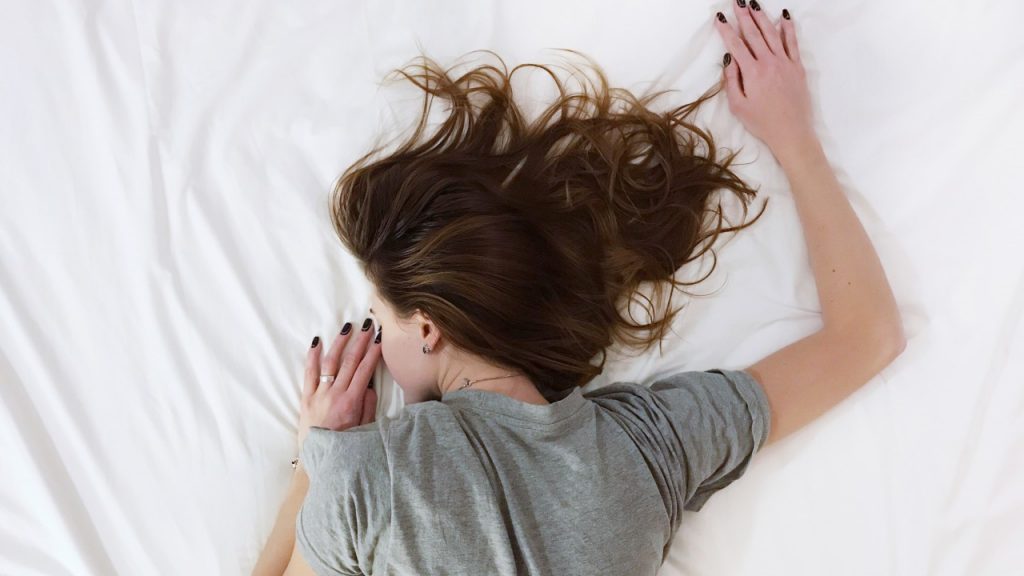My cousin Joey always seemed to have an internal sleep switch he could flip at will. When we were kids, I envied him terribly for this. At night, we’d be in the middle of a Monopoly game and he would mention his sleepiness. Before we’d had a chance to roll the dice, he’d disappear into his bedroom. A few moments later he’d be curled in slumber.
I’m not like Joey — I’ve always been the last one to fall asleep, tossing and turning as I tried to settle my thoughts. As a result, I’ve also been the last one to wake in the morning, groggy and grumpy. At a slumber party in the seventh grade, I was woken one morning after a particularly rough night. I stood up, glared at the other girls and said “I hate you all,” as I hopped up the stairs in my sleeping bag.
Help came through a book called Sleepless in America by Mary Sheedy Kurcinka. Although this book is intended to help parents ease their children into sleep, it also helped me to become more aware of the ways in which I was sabotaging my own slumber. Apparently, I am not alone in this — nearly 50 percent of American adults report chronic sleep problems.
For those who struggle to unwind, here are a few tips:
Reset Your Body Clock
We sleep best on a regular schedule. According to Kurcinka, a consistent wake time helps cue our bodies to fall asleep at the same time each night. Choose a sleep and wake time that will allow you to get the sleep you need (keeping in mind that sleep experts recommend between 8 and 10 hours of sleep for adults). It generally takes two weeks to reset a sleep schedule, but after your body learns the routine, sleep becomes less of a struggle.
Slow Down
The frantic pace of life is exhausting, but it doesn’t lead to restful sleep. In fact, overscheduled lives lead to restless sleep. When there is too much going on, we find ourselves tossing and turning, worrying about unfinished business and seemingly unsolvable problems.
Caffeine and vigorous exercise too late in the day contribute to this problem. Caffeine stays in our bodies up to six hours, and exercising within three hours of sleep raises our body temperatures and prevents the drop in body temperature that precedes sleep.
According to Kurcinka, by increasing our awareness of the activities and stimulants that compromise sleep, we can make positive changes. Likewise, internalized stress spills over into our nights. Eliminate unnecessary stressors whenever possible. “A good night’s sleep begins in the morning,” writes Kurcinka, “Sleep is dynamic, ever-changing, and keenly sensitive to the stresses and strains of daily life.”
Don’t Force It
According to the International Sleep Expert Dr. Mark Mahowald, one of the worst things to do when you can’t fall asleep is to try to force it. We inadvertently rouse ourselves as we become increasingly frustrated with our inability to sleep. When insomnia sets in, get out of bed and try reading until your body relaxes toward sleep. Mahowald believes that the still of the night should not be used productively — no homework, checkbook balancing, or cleaning. If we use these hours for work we may set ourselves up for a cycle of “productive” insomnia.
Dim the Lights
Certain evening activities sabotage sleep. According to Mary Sheedy Kircinka, anything involving bright lights — particularly computer and television screens — should be avoided at night. She recommends turning off computers and televisions no later than eight o’clock, so that there is time to slowly wind down.
Before the light bulb was invented, people slept an average of nine hours nightly. In our day, people sleep an average of about seven hours a night during the workweek. By keeping the lights low at night, you can help your body realize that it is time for sleep.
By contrast, exposure to bright early morning light is deeply beneficial. According to Dr. Peter Van Houten and Gyandev Rich McCord, coauthors of Overcoming Insomnia, early morning sunlight helps break down melatonin, a sleep-inducing chemical in our brains. Between 30 and 45 minutes of exposure to bright early morning sun can help decrease melatonin, causing more alertness throughout the day. At the end of the day, when you want melatonin levels to rise again, dim lights will help bring on that sleepy feeling.
The Curtain Call
The room in which we slumber also has an effect on the sleep we experience there. Ideally, sleeping spaces should be as dark, quiet and cool as possible. Some people find it helpful to buy blackout shades and to flip over their alarm clocks so that the numbers don’t glare at them all night long.
Likewise, an uncluttered, orderly bedroom is more conducive to sleep then a bedroom packed with reminders of things left undone. Ideally, desks piled with unpaid bills and unfinished projects should not be the last thing we glimpse at night. If you sleep close to your working space, you may be tempted to get up and put in a few extra hours.
Although it’s possible to tackle work-related tasks in the wee hours of the night, it’s not ideal. The Psalms seem to perfectly describe the curse of workaholism: “In vain you rise early and stay up late, toiling for food to eat — for He gives sleep to his beloved” (Psalm 127: 2).
When we sacrifice sleep for work, we sacrifice mental acuity the following day. Less sleep also translates into less mental stability, more irritability, and compromised immune systems. Some recent studies have even shown a link between sleep deprivation and obesity.
Increasingly sleep experts advise students who are tempted to stay awake and cram from exams to go to bed instead. The risk of a night spent cramming followed by an episode of “blanking out” is too great to be ignored. Sleep is as critical to success as hard work.
The Gift of Sleep
Sleep is one of the great mysteries of the Christian life. God’s design, in which we spend a third of our lives sleeping, parallels his command to keep a Sabbath, said Dr. Albert Rossi, a psychologist and one of my seminary professors. Sleep restores neurotransmitters, causing our brains to function better and preventing depression. “God gives us sleep to help us live better,” he added.
Sleep is also a reminder of our mortality. The threshold of sleep is the very edge of life. “Sleep is a gift of death,” Rossi said. “In sleep we have no more money, memory or consciousness. Each night, we experience a small death as a prelude to our ultimate death, and each morning we experience a small resurrection.” George MacDonald echoed his sentiments, saying that in sleep our bodies are “sown in weakness, but raised in power.”
Choosing sleep involves a daily act of surrender. Humility comes as we realize our own limitations and our need for sleep. As C.J. Mahaney writes, “Don’t just fall asleep but seize the moment to weaken pride and cultivate humility by acknowledging that you are not self-sufficient, you are not the Creator. Sleep is a daily reminder that we are completely dependent upon God.”
Just as there would be no Resurrection without death, our ability to rise with power is directly related to our ability to surrender to this gift — to recognize each day that we’ve come to the end of our own finite resources and to let the nightly Sabbath restore us.
Copyright 2006 Jenny Schroedel. All rights reserved.









